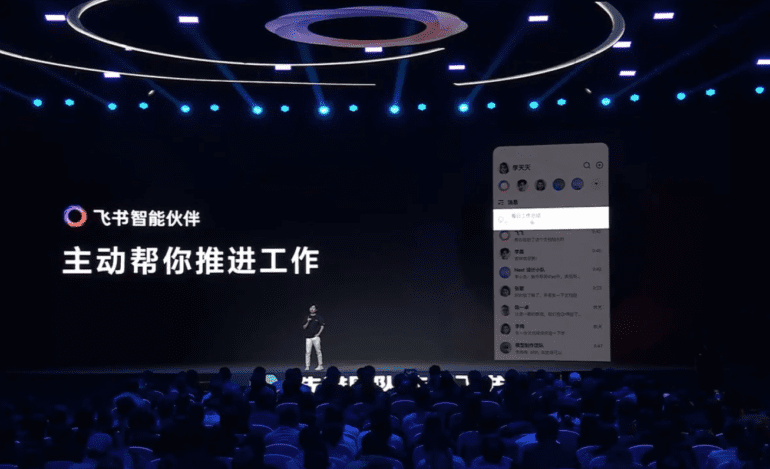TL;DR:
- ByteDance has upgraded its collaboration tool Feishu, introducing Feishu 7 with AI capabilities.
- The Feishu Intelligent Buddy AI assistant enhances workplace efficiency by summarizing meetings, analyzing content, and drafting various documents.
- Users can choose from different large language models (LLMs) to customize their AI assistant.
- Notable Chinese companies have already leveraged Feishu Intelligent Buddy for improved sales and marketing efficiency.
- ByteDance competes with Tencent and Alibaba in the growing market of AI-infused office tools.
Main AI News:
In the ever-evolving landscape of business technology, ByteDance, the parent company of TikTok, has taken a significant stride forward by infusing its online collaboration tool, Feishu, with the power of artificial intelligence. This strategic move places ByteDance in direct competition with tech giants Tencent and Alibaba, all vying for dominance in the burgeoning realm of workplace chatbots.
Feishu 7, the latest iteration of this versatile office tool, was officially unveiled in Beijing, signaling ByteDance’s commitment to ushering Chinese enterprises into the era of AI-driven productivity. Under the guidance of Feishu CEO Xie Xin, this transformative update integrates ChatGPT-like capabilities, harnessing the prowess of large language models (LLMs) to empower businesses across China.
Xie Xin emphasized the profound impact of AI on the modern workspace, stating, “We’ve seen AI is changing the way we work and pushing for the evolution of our organizations. It’s critical for entrepreneurs to ensure their companies can quickly adapt to and get ready for the fast-moving era of artificial intelligence.”
At the core of this technological leap lies LLMs, the foundation behind products like ChatGPT. ByteDance’s Feishu 7 positions itself as a robust platform for businesses seeking to harness AI’s transformative potential.
Introducing the Feishu Intelligent Buddy, a cutting-edge AI assistant poised to elevate workplace efficiency to unprecedented heights. This virtual assistant boasts an array of capabilities, from summarizing meetings and unread messages to analyzing content within PDF documents, videos, and audio files. It doesn’t stop there – the Feishu Intelligent Buddy can seamlessly draft a variety of work documents, including emails, spreadsheets, mind maps, and survey forms.
Xie Xin exemplified the assistant’s capabilities, explaining how simple it is to request the generation of a spreadsheet for an “inventory management system.” Furthermore, users can fine-tune their documents with ease, making requests for new fields and table adjustments.
“The best way to introduce large language models should be the addition of an intelligent and capable person,” Xie Xin asserted. “And this person will not only perform multiple tasks but also will keep gaining new abilities.“
One standout feature of Feishu’s assistant is the flexibility it offers to users. Customers can choose the LLM that aligns with their specific needs, with support for models from Tencent-backed unicorn MiniMax, state-backed Zhipu AI, and Baichuan, a startup founded by Sogou’s Wang Xiaochuan.
Feishu has already gained traction among prominent Chinese companies, including Anker Innovations Technology and Yuanqi Senlin, a beverage startup. These enterprises have harnessed the power of Feishu Intelligent Buddy to enhance efficiency in vital areas such as sales and marketing.
This strategic integration of AI into office software aligns with the broader industry trend, where tech giants are positioning themselves to maximize the adoption of AI technology. Microsoft, for instance, has seamlessly integrated its GPT-powered Copilot systems into various products, vigorously promoting AI adoption in Asia.
In China, Tencent Holdings and Alibaba Group Holding have also been proactive in integrating AI systems into their office tools. Tencent’s Hunyuan model has found its way into products like Tencent Docs and WeChat search, while Alibaba has incorporated its Tongyi Qianwen model into DingTalk, a direct competitor to Feishu.
Conclusion:
ByteDance’s integration of AI into Feishu 7 strengthens its position in the competitive market of AI-powered office tools. This move signifies the increasing importance of AI in streamlining workplace operations, with ByteDance aiming to empower Chinese enterprises to adapt to the era of artificial intelligence. As tech giants like Microsoft, Tencent, and Alibaba intensify their AI integration efforts, businesses can expect enhanced productivity and efficiency in their operations.

